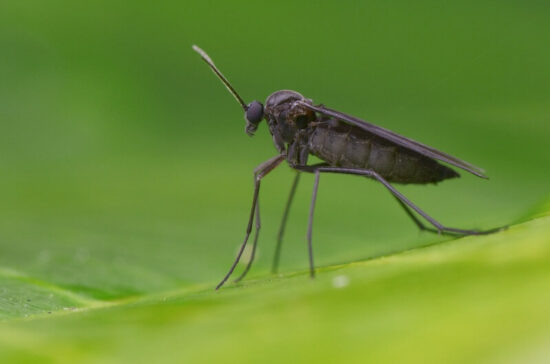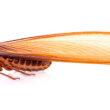Gnats can be a real nuisance. Not only are they persistent, but they can reproduce at an alarming rate.
Fortunately, there are a number of scents that gnats hate which you can use to repel them with ease. Check out this list and give them a try!
1. Peppermint
Using peppermint essential oil gives off an all-natural smell that gnats hate, making it a fantastic repellent that we recommend to just about anyone. Not only does it smell good (to us), but it does a pretty decent job of keeping gnats at bay. Just be aware that using peppermint oil is meant to deter the gnats and not actually kill them. To totally get rid of your gnat issue, you’ll need to call a pest control company.
The way to use peppermint oil as a smell to repel gnats is actually pretty simple, and all you need is a spray bottle, some dish soap and peppermint essential oil. Combine a cup of water, half a cup of dish soap and around 12 drops of peppermint essential oil in your spray bottle. Feel free to add a few more drops if you want the spray to be a bit stronger. This peppermint oil spray can be used inside your home, or you can spray it around your porch, patio or deck.
Houseplants tend to be gnat breeding grounds, so lightly spraying the base of the plant may keep gnats from laying their eggs on your plant.
Expert Tip: If you have dogs or cats you may want to try another all-natural remedy. Peppermint oil can be harmful to pets, so we don’t recommend using peppermint oil in a spray or a diffuser if you have pets around.
2. Lemon Essential Oil
You may love the clean and fresh smell of lemons, but gnats hate it! Using lemon essential oil is yet another all-natural scent you can use to repel gnats from your home or yard. As with peppermint oil, lemon oil can be very harmful to some pets. We highly suggest checking with your veterinarian before using this treatment in your home.
To use lemon essential oil, you can follow the peppermint spray recipe that’s mentioned above as a guide. Simply substitute lemon essential oil for the peppermint oil and mix it with the dish soap and water. Lightly spray it around the areas where you are having problems with gnats.
3. Citronella
When you think of citronella, you probably think of the torches and candles used to keep mosquitoes away from summertime outdoor gatherings. Did you know that citronella products can also be used to keep clouds of gnats from invading your next picnic or barbeque? Whether you use citronella candles, tiki torches, citronella essential oil or a citronella plant, you’ll want to make sure to use this bug repellent at all of your outdoor events.
We’d like to mention here that citronella products are only for outdoor use, and they should not be used indoors. Also, if you have a citronella plant, you will need to crush a few leaves and put them in a spray bottle filled with water. This plant does not release its scent that gnats hate unless the leaves are disturbed, so making a citronella spray is the best way to make use of your plant.
An effective spray can also be made using citronella oil. Mix two cups of warm water, two spoons of citronella oil and four or five drops of dish soap in a spray bottle. Spray it wherever you want to repel gnats.
4. Vanilla
Don’t let gnats ruin your enjoyment of the great outdoors. Instead of miserably swatting away at gnats swarming around your head, you can make a very effective and delicious smelling gnat repellent using vanilla.
Put a tablespoon of pure vanilla extract and a tablespoon of water into a small bowl. Dip a cotton ball into the mixture, dab it on the exposed areas of your skin and reapply it every half hour or so. This is a powerful smell that gnats hate, so you’ll stay protected while you’re outside. You may want to do a small test area to make sure that you don’t have an allergy to vanilla.
5. Lavender
You might find the scent of lavender to be soothing and enjoyable, but it’s also a smell that gnats hate. This can be the actual lavender plant, but it can also be lavender essential oil. If you have an area in your yard that is particularly prone to gnats, then you can try planting lavender plants in that area. However, not everyone lives in an area where lavender grows.
Lavender oil mixed with water and dish soap can be sprayed in outdoor areas such as porches, patios and decks, or it can be lightly sprayed around the inside of your home. While lavender oil is supposed to be safe to use around pets, we highly suggest double checking with your pet’s health provider before using this spray inside your house.
6. Eucalyptus Essential Oil
You may be familiar with eucalyptus oil from its use in cold remedies, massage oils, body creams and antiseptic treatments. Many people find its medicinal scent to be quite pleasing, but gnats hate it! For this reason, using eucalyptus oil as an all-natural spemm for repelling gnats can be quite effective.
Instead of making a spray bottle solution, many people choose to put a few drops of eucalyptus oil into their diffuser. The eucalyptus-scented mist is an excellent way to control gnats in your home, but it is absolutely toxic for pets. There are plenty of other wonderful home remedies that work well and are not harmful to your furry friends.
If you are just looking for an outdoor-only spray for your deck or patio, then you can make one using a combination of eucalyptus, geranium and rosemary oils. Make sure that pets and young kids aren’t around while you are spraying.
7. Cedarwood
Unlike eucalyptus oil, cedarwood oil is safe to use around both dogs and cats. In fact, some people use it as part of a flea treatment. It’s always best, however, to read labels carefully and to discuss your concerns with your pet’s veterinarian.
Cedarwood oil is a scent that can repel gnats in several different ways, depending on where you are planning to use it. For example, if you are trying to get rid of indoor gnats, then you may want to put a few drops into your diffuser and let it run for a while.
To use cedarwood outdoors, we suggest creating a spray using cedarwood oil diluted with water. This will help to get rid of gnats in your garden, grass and in any of your favorite outdoor living spaces.
Expert Tip: To prevent gnats from flying into your face or swarming around your body, put some drops of cedarwood oil into a carrier oil, like olive oil or coconut oil, and dab it on your exposed skin with a cotton ball.
8. Apple Cider Vinegar
It seems like uses for apple cider vinegar are being discovered all the time. Whether you use it to clean windows, tenderize meat, improve your health or deodorize your sink, apple cider vinegar is an absolute all-natural super power.
If you’re dealing with an indoor gnat issue (like gnats in a litter box), then you may want to consider making your own apple cider vinegar gnat trap. It’s super easy to make, and it only requires supplies that you probably already have.
The idea behind this trap is similar to the banana peel trap technique that we’ll cover further down in this list. You want to create a situation where the gnats can get in but can’t get out.
For the apple cider vinegar trap, you are going to put a cup of water, two tablespoons of apple cider vinegar and a tablespoon of sugar into a jar. Adding a few drops of dish soap is helpful as well. Mix it all up and cover the top of the jar with plastic wrap. Poke small holes into the plastic wrap. Place your trap wherever you have a gnat problem. Just remember to change the vinegar every couple of days until the gnats are gone.
9. Tea Tree Oil
Tea tree oil, also known as melaleuca oil, is highly prized for its antibacterial, antifungal and anti-inflammatory properties. Tea tree oil has been used by many cultures as a natural insecticide, and it has a scent that gnats hate. On top of that, making your own spray out of it is actually quite simple to do.
In much the same way that you would make some of the other anti-gnat sprays we talked about, you are going to combine one cup of water, a half teaspoon of dish soap and around 12 drops of tea tree oil in a spray bottle. Shake it well and spray the solution anywhere you see gnats. You can also spray the tea tree mixture outside your house as a kind of protective border.
Expert Tip: Like with many of the essential oils we discussed, tea tree oil is very toxic to pets. Even when diluted, as in this homemade bug repellent, it can be fatal to pets if ingested.
10. No Natz
If you’re looking for a DEET-free spray that is made with all-natural materials, then No Natz may be for you. It’s made with some of the essential oils we talked about before, and the nice thing is that you don’t have to mess around with the ingredients yourself.
Made with citronella oil, geranium oil, lemongrass oil and rosemary oil, the smell is pleasant to humans, but gnats and other insects, such as mosquitoes and chiggers, really hate it.
Spray No Natz on your clothes and body whenever you are going to be in gnat-prone areas. It’s a scent that gnats hate and will do a fantastic job of repelling them. No Natz also comes in a candle, so it’s perfect for creating a pleasant-scented and gnat-free backyard experience.
11. Rosemary
There are a couple of effective ways that rosemary can be used to keep gnats from ruining your outdoor or indoor activities. If you like the smell of rosemary, then it may be a nice idea to plant rosemary in your garden, or you can simply place pots of rosemary wherever you hang out most in your backyard. Small pots of rosemary can be brought inside as well.
You can also add rosemary oil to water and spray it around your yard. This should create a smell that gnats hate and discourage them from hanging around your yard and laying eggs.
12. DEET
DEET is next on our list of scents that gnats hate. It’s not all-natural, but it’s definitely worth mentioning.
So what is DEET? N-Diethyl-meta-toluamide, otherwise known as DEET, is one of the main ingredients in insect sprays such as Off! and Cutter. Many people prefer to use DEET products because this chemical is known to ward off mosquitoes and ticks that carry diseases such as Lyme Disease, West Nile Virus and Zika Virus. It’s quite effective.
One thing to be aware of with products that contain DEET is that DEET can sometimes cause health issues such as rashes, skin irritation and even stomach upset. If you’re not sure whether DEET products are for you, ask your health care provider to help you sort through DEET’s risks and benefits.
If you do decide to use a product containing DEET to help you repel gnats, then you’ll want to spray it on your clothes before going outdoors.
13. Neem Oil
If you’ve never heard of neem oil, then you’re not alone. Made from the seeds of the neem tree, this tree is better known in Asian countries like India, Cambodia, Thailand and Indonesia. Throughout history, neem oil has been used for skin care, first aid treatments and as an insecticide.
Neem oil is now more widely available, and it has proven to be a very effective smell that gnats absolutely hate (especially when it comes to taking care of gnat eggs and gnat larvae). The best way to use neem oil in your yard is to make a spray. Using a cup of warm water, two tablespoons of neem oil and a tablespoon of Castile soap, you can make a spray that will not only rid your yard of gnats, but you will also kill aphids and other garden pests.
Once you’ve made your mixture, simply spray any areas of your yard that seem to be prone to gnats. Make sure to thoroughly spray the root and base part of the plants because this is where gnats lay their eggs. It’s also beneficial to spray plant leaves to immediately kill egg laying adults.
Have a compost or mulch pile? You’ll need to spray those areas as well because gnats love a wet, rotting pile of compost. Spray all suspected spots very carefully.
Technically, neem oil is safe to use around pets, but its use should be limited. If you want to use a neem oil treatment around or on your pet, please check with your veterinarian. Pets with certain health conditions, or ones taking certain medications, may have a negative reaction around neem oil products.
14. Banana Peels
Gnats love bananas, and you can use this fact to your advantage to create an easy, budget-friendly and effective gnat trap.
To make your trap, grab a small plastic container and poke a few holes in the lid. The holes should not be too big because you don’t want the gnats escaping your trap. On the other hand, you’ll need to make sure that the holes are big enough for the gnats to enter the container. Try using a toothpick to poke the holes, and then you can just make the holes a little wider.
Next, place a banana peel in the container. If you are using a small container, then just put in part of the peel. For an added measure, you can put a couple of drops of dish soap in with the peels. The theory is that this will make the trap extra sticky.
Place your banana peel trap wherever you see gnats. Since they can’t seem to resist the scent of a banana, the hope is that the gnats will fly into the trap for a snack and get stuck there. Change out the banana peel every few days. Use this method until the gnats are all gone.
In Conclusion
Now that you’re familiar with all of the smells and scents that gnats hate, all you need to do is start using them! Don’t be afraid to experiment and see which works best for you.
If you have any interesting DIY concoctions that you’ve had success with, don’t hesitate to share!


